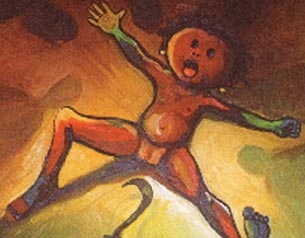Hibo's Song
A personal look at the physical and mental after effects of female circumcision.
 Far out in the African bush a 4000-year-old ritual takes place. Often in non-sterile conditions, using the simplest tools of broken glass or razors, and without anaesthetic, young girls have their genitals cut off and sewn up. Female circumcision is practised in about 30 African countries. Somalian singer Hibo, circumcised as a child, sings about the pain of African women and through their words we hear how their lives have been affected by their grandmothers' choices.
Far out in the African bush a 4000-year-old ritual takes place. Often in non-sterile conditions, using the simplest tools of broken glass or razors, and without anaesthetic, young girls have their genitals cut off and sewn up. Female circumcision is practised in about 30 African countries. Somalian singer Hibo, circumcised as a child, sings about the pain of African women and through their words we hear how their lives have been affected by their grandmothers' choices.
'Old withered women sew sweet little girls like worn withered water bags. And the girls, the sweet little girls, they shatter, hearts and bodies broken'. Hibo's song takes us to a remote village in Somalia. A newborn girl has recently undergone Pharoanic circumcision. The mother spreads the screaming baby's legs to show the result. The tiny genitals are tightly sewn.
'It's religious reason, Koran', says the circumciser. 'Unless the baby is circumcised it always cries. It has an itching sensation.' The old woman holds a rusty-looking knife. The unspeakable pain the cut has already caused this little girl will continue to influence the rest of her life. It will hurt when she menstruates and urinates, when she has sexual intercourse and when she gives birth. She will be cut open and sewn back together many times and she may die of complications.
'I was 8 when they cut me. My father was against it. My mother couldn't object, because the idea comes from the grandmothers. It's a woman's invention'. Gihad is from Sudan and lives in Berlin. 'This is a problem for men too, but they can't change it', confirms her husband. She recalls the excitement surrounding the event: 'In our culture we really celebrate it. You get presents, sometimes money. A special nightgown is sewn for you. Young girls get very excited'. Then comes the pain: 'I held my father's hands and yelled very loud.'
Why do women put their daughters through this cruel ritual? 'It's kind of a protection for women,' tells Gihad and a pernicious reality becomes apparent. 'In Africa, family is your pension scheme, your nursing care, your life insurance, your health insurance and there is no alternative.' Because husbands demand virginal brides, women invented this tradition to guarantee their daughters a place in the community. 'Better sew them up so they can't have sex.'
German gynaecologist Sabine Mueller has many years experience in treating circumcised women. 'Women we see don't talk about the cut at first. It has to do with the taboo.' She offers reconstructive surgery to her patients to relieve the pain and make childbirth easier. But to most women, this is a difficult step to take. 'We have to consider the psychological and social aspects, the feeling of belonging to a group. These patients were sexually traumatised, like rape victims'. Despite her awareness of the benefits, Gihad took two years to decide. 'The operation alone doesn't make you happy. Some things can't be healed.'
A film by Renate Bernhard and Sigrid Dethloff
FULL SYNOPSIS
A film by Renate Bernhard and Sigrid Dethloff
